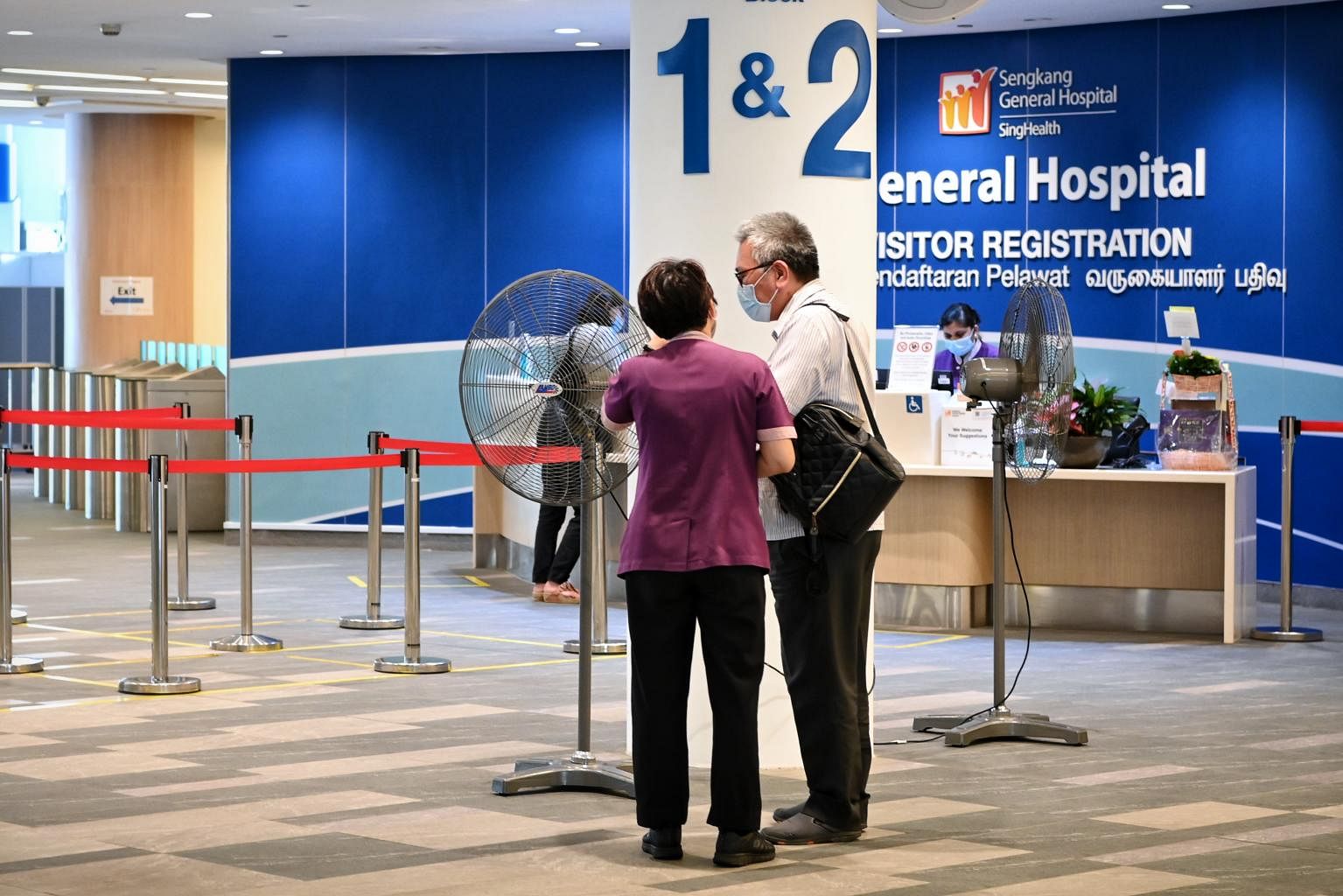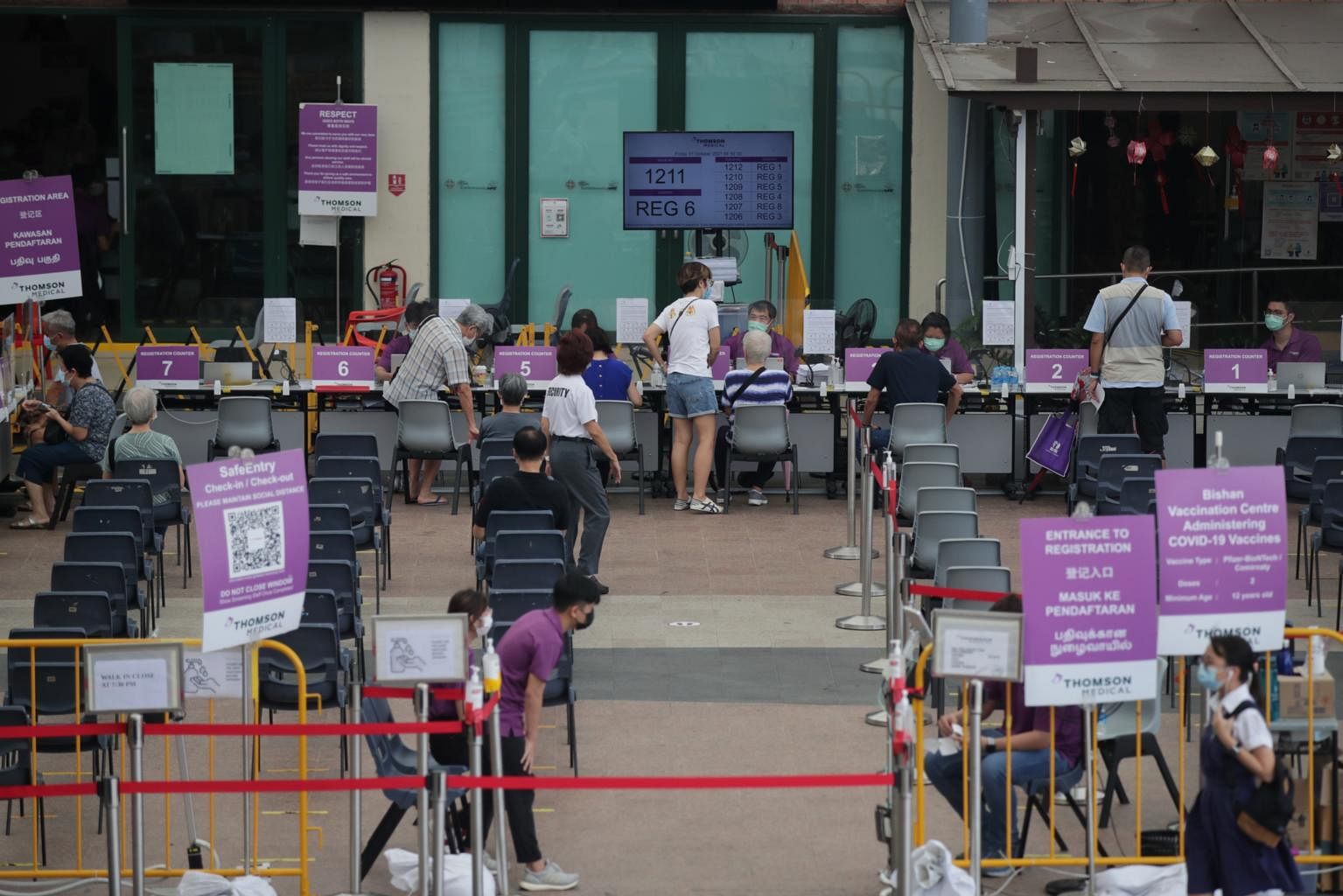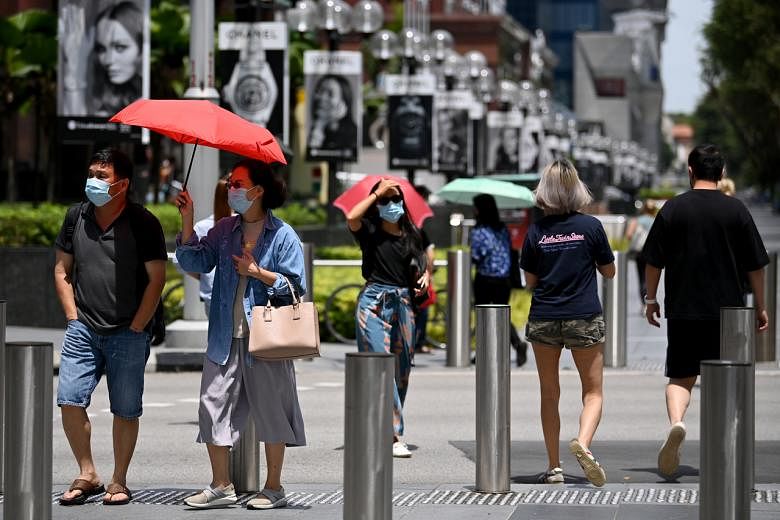SINGAPORE - Prime Minister Lee Hsien Loong addressed the nation on Saturday (Oct 9) on the Covid-19 situation and the path to the new normal.
After Mr Lee set out Singapore's next steps, the multi-ministry task force handling Covid-19 here announced simplified health protocols, updates to the home recovery programme (HRP) and a further reopening of borders.
Here are 10 key points:
1. Vaccinations an effective "safety vest" against the virus
Singapore has been very successful at getting everyone vaccinated - almost 85 per cent of the population is now fully vaccinated, and the data has shown that this has sharply reduced the risk of serious illness here, said Prime Minster Lee Hsien Loong. Only 2 per cent of cases have developed serious illness, while 0.2 per cent - two cases of every thousand - have died or needed intensive care unit (ICU) treatment.
Of the 423 cases with severe illness in the last two weeks, more than half (53.9 per cent) were unvaccinated. The rest were vaccinated individuals with several medical conditions.
The number of people needing intensive care continues to rise at the same rate as overall case numbers, albeit with a lag. There have been 51 new cases in the intensive care unit (ICU) over the past two weeks, compared with 32 over the preceding two weeks.
2. Delta variant has changed the situation
While Singapore's original "zero Covid" strategy had avoided huge losses of life, the highly infectious Delta variant means that even with the whole population vaccinated, Singapore will not be able to stamp out cases through lockdowns and safe management measures (SMMs). Even if new cases are kept down with stringent SMMs, cases will surge again as soon as they are eased, said Mr Lee, especially since most in Singapore have never been infected. This is why people must be prepared to see quite a number of cases for some time to come.
3. Singapore will press on to live with Covid-19, but updated mindsets are needed
With Covid-19 now a treatable and mild disease with vaccinations, people should respect the virus but not live in paralysis and fear because of it, said Mr Lee. People should go on with their daily lives while taking necessary precautions. That 98 per cent of patients are able to recover from the illness by themselves - just as with the flu - is why Singapore has shifted to rely heavily on home recovery, freeing up hospital beds for those at high risk of becoming seriously ill.
He added that Singapore is making steady progress to reaching the new normal of Covid-19 resilience, even if sometimes it may not feel like it. While it may have to tap on the brakes again if cases grow too fast once more, after this wave it will be better able to cope with future surges as healthcare capacity and processes keep improving, and more are exposed to the virus and recover, raising immunity levels.
READ FULL STORY: S'pore must press on with living with Covid-19, not be paralysed by fear: PM Lee
4. Daily cases likely to rise for a few more weeks, 'new normal' three to six months away
The healthcare system will likely stay under pressure for the next few weeks as daily cases continue to rise, but cases will eventually decline. From the experience of other countries, this could be hopefully within a month or so, said Mr Lee. Restrictions can then be relaxed as pressure on the healthcare system eases, but this will have to be done cautiously to avoid setting off a new wave of infections.

People will know the new normal has been reached when restrictions are largely lifted, there are only light measures in place, daily new cases remain stable at hundreds a day without growing, and hospitals will be able to go back to business as usual. Some countries such as those in Europe have already reached this state but paid dearly in lives lost along the way, noted Mr Lee. Singapore will get there in a careful and safe manner, with as few casualties as possible.
READ FULL STORY: Singapore's Covid-19 'new normal' expected to be 3 to 6 months away: PM Lee
5. No more 'complicated flow charts'
Since Covid-19 is now a manageable disease, the Government will drastically simplify health measures so that everyone is clear what to do if they test positive or come into contact with someone who is infected. This includes testing as necessary, to self-isolate should the test be positive, and to consult a doctor if there are symptoms. This is to keep everyone safe, especially the elderly and vulnerable, said Mr Lee.
The streamlined new protocols, which will start from next Monday (Oct 11), are:
Protocol 1: Those who are unwell and tested positive should see a doctor. They will either be placed on the HRP by default or can recover at care facilities if their home is not suitable.
Protocol 2: Those who tested positive and are well should self-isolate at home for the next 72 hours. After 72 hours, they can retest, and if negative, they may exit isolation and resume normal activities. If they become unwell at any time, they should see a doctor.
Protocol 3: All existing protocols including quarantine orders will be replaced by a health risk warning (HRW). Upon being notified of the HRW (Day 1), the person should immediately self-isolate, take an antigen rapid test (ART) and upload the result. He can continue with normal activities for the day if the test is negative. From Day 2 to 7, the person should take an ART daily and go out only if he tests negative. He should follow Protocol 2 if any of the tests are positive. There is no need for further tests if the Day 7 test is negative.
6. Unvaccinated elderly worries me most: PM
Of the 142 deaths from Covid-19 here so far, nearly all were elderly with pre-existing medical conditions. Unvaccinated seniors are barely 1.5 per cent of the population, yet make up a disproportionate two-thirds of those who needed ICU care or died, said Mr Lee. The remaining one-third were vaccinated seniors. The Government will continue trying hard to persuade the elderly to get vaccinated and to get booster shots, said Mr Lee. The data shows that a booster shot reduces a senior's risk of severe infection by more than 10 times, making the risk profile of an 80-year-old look like that of a 50-plus year-old, he noted.
Mr Lee added that Singapore is closely tracking the progress of vaccine trials on children in the US. Vaccinations for children here will start as soon as they approved for children under 12 and experts here are satisfied they are safe. This is likely to be early next year, he said.
7. More eligible for home recovery programme; timed discharge
From Sunday (Oct 10), home recovery will be extended to unvaccinated people aged 12 to 49, as the number of younger and unvaccinated people with severe illness is low, and it is safe for them to recover at home.
It will also be safer for vaccinated Covid-19 patients aged 70 to 79 to recover in the familiar surroundings of their home, said the Ministry of Health (MOH).

Default home recovery will also be extended to children aged five to 11 years old. Children aged one to four can also recover at home, provided they are first assessed at the hospitals to be suitable for home recovery.
MOH said infected individuals enrolled in the HRP will be discharged based on the duration since diagnosis, without the need for further tests.
For vaccinated individuals and children aged 12 years and below, the HRP isolation period will last for 10 days, while that for unvaccinated individuals above 12 will last for 14 days. Thereafter, they will be given an electronic discharge memo at the end of their isolation period.
The existing procedure where a vaccinated person can be discharged on Day 7 after a negative PCR test will be removed.
READ FULL STORY: Home recovery the default Covid-19 care arrangement, except for certain groups
8. Unvaccinated people can no longer eat at hawker centres, enter shopping malls
MOH said it will expand vaccine-differentiated safe management rules from next Wednesday (Oct 13) to cover shopping malls, attractions, hawker centres, and coffee shops.
This means that only groups of up to two fully vaccinated people will be allowed to dine-in at hawker centres and coffee shops - similar to the rules in place for all other eateries and restaurants now. Unvaccinated people can still buy takeaway food.
Likewise, only fully vaccinated people can enter shopping malls or attractions, in groups of two.
Children aged 12 and below, those who have recovered from Covid-19 and unvaccinated people with a valid negative pre-event test (PET) result can be included in the group of two, MOH said.
This move is to protect the unvaccinated and reduce the strain on the healthcare system, the ministry added.
9. Expanded booster vaccination strategy
From Saturday, booster vaccinations will be offered to healthcare workers, as well as front-line Covid-19 workers who were fully vaccinated around six months ago.
MOH is working with various institutions to progressively roll out booster vaccinations to eligible people in places such as prisons and residential care facilities.

It will also progressively invite people aged 30 and above who also completed their vaccination regimen around six months ago to make an appointment for their booster dose. These individuals may receive their booster dose at any vaccination centre or participating Public Health Preparedness Clinic.
10. Quarantine-free travel to nine other countries
Travellers vaccinated against Covid-19 will be able to fly to nine more countries and return without quarantine in the coming weeks.
Travel to Singapore will also be made easier, with visitors under the Vaccinated Travel Lane (VTL) scheme needing only two Covid-19 swab tests in order to enter Singapore, down from the current four.
The two are: a pre-departure and on-arrival polymerase chain reaction (PCR) test.
From Oct 19, vaccinated travellers be able to fly to Canada, Denmark, France, Italy, the Netherlands, Spain, Britain and the United States.
The scheme will be extended to South Korea from Nov 15, the Ministry of Transport had said on Friday.
READ FULL STORY: S'pore to allow quarantine-free travel to 9 more countries, including US, UK











